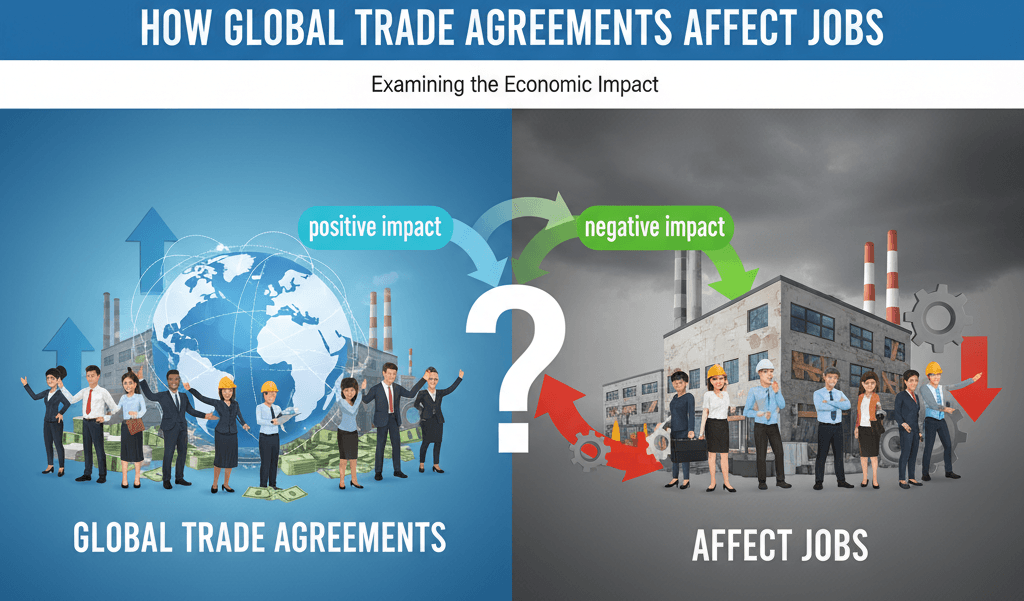How Global Trade Agreements Affect Jobs?
How Global Trade Agreements Affect Jobs?
For many years, international trade agreements have molded the global economy, impacting everything from consumer goods prices to the stability of jobs across industries. Agreements such as the Trans-Pacific Partnership (TPP), the North American Free Trade Agreement (NAFTA), and World Trade Organization (WTO) regulations have a significant impact on how labor markets change in a globalized economy.
For the United States and many other countries, the big question remains: Do trade deals create jobs, or do they eliminate them? The answer is complex. Trade agreements bring both opportunities and challenges, creating winners and losers in the job market. This article explores how global trade agreements affect employment, wages, industries, and the future of work.
HSBC Cashback Credit Card 2025 – Benefits, Rewards & How to Apply?

Comprehending International Trade Agreements
A negotiated agreement that establishes the guidelines for economic exchange between nations is called a trade agreement. These contracts may:
- Reduced import taxes and levies.
- Lessen the limitations on products and services.
- Set environmental and labor requirements.
- Make fresh chances for investment.
For instance, NAFTA (1994) changed industries like manufacturing and agriculture by removing the majority of tariffs between the United States, Canada, and Mexico. In a similar vein, the WTO created international regulations on tariffs and trade disputes.
Trade agreements expose American workers to international competition, but they can also open markets for American companies.
Benefits of Trade Agreements for Employment
Export Growth Leads to the Creation of Jobs
Lower tariffs allow American businesses to sell more goods overseas. Industries that have profited greatly include technology, aerospace, and agriculture.
Fresh Prospects in High-Skilled Sectors
Jobs in technology, research, design, and logistics have increased as a result of global trade. For instance, the expansion of global supply chains has increased the need for engineers, shipping specialists, and data analysts.
Benefits to Consumers That Create Jobs
Consumer purchasing power rises when import prices decline. More jobs in service sectors like retail, healthcare, and hospitality are frequently created by this increased spending.
Increased International Competitiveness
Businesses that go global get bigger and add more employees. For example, access to international markets has allowed the U.S. agriculture industry to employ millions of people.
Trade agreements’ detrimental effects on employment
Manufacturing Job Losses
Outsourcing is one of the main arguments against trade agreements. Millions of American manufacturing jobs have been lost as a result of U.S. corporations moving their plants abroad due to lower labor costs in nations like China, Mexico, and Vietnam.
Pressure on Wages for Low-Skilled Workers
Due to global competitiveness, American workers must contend with lower-priced labor abroad. Pay may suffer as a result, especially for low- and middle-skilled workers in sectors like electronics, steel, and textiles.
Economic Disparities by Region
Some areas are more affected than others. Since the 1990s, globalization and trade agreements have caused substantial industrial closures in Rust Belt areas including Michigan, Ohio, and Pennsylvania.
Increased Job Insecurity
With the ability to relocate production abroad, companies sometimes use trade agreements as leverage against workers in wage and contract negotiations.
How Trade Agreements Affect Different Industries
- Manufacturing: The most negatively affected, with widespread outsourcing.
- Agriculture: Generally benefits, as U.S. farmers gain access to global markets.
- Technology: Benefits from intellectual property protections and global supply chains.
- Services: Mixed impact — outsourcing call centers and IT jobs, but growth in finance, logistics, and healthcare.
The Function of Trade Agreements vs. Automation
It is crucial to remember that trade is not the only factor contributing to employment losses. Many occupations that were formerly attributed to trade agreements have been replaced by automation and robotics. Studies show that technology advancements were more responsible for the loss of manufacturing jobs in the United States than outsourcing alone. However, trade agreements accelerated job shifts by opening borders to global competition.
Labor Standards and Worker Rights in Trade Deals
Recent trade agreements increasingly include labor protections. For example, the U.S.-Mexico-Canada Agreement (USMCA), which replaced NAFTA in 2020, introduced stricter labor standards, wage requirements for auto workers, and mechanisms to protect union rights.
These provisions aim to prevent a “race to the bottom,” where companies move operations to countries with the lowest labor standards.
Future of Jobs Under Global Trade Agreements
Green Jobs and Renewable Energy
Future trade agreements may prioritize climate goals, boosting jobs in renewable energy, electric vehicles, and sustainable agriculture.
Digital Trade
With the rise of e-commerce, new trade agreements may focus on cross-border data flows, cybersecurity, and intellectual property, creating jobs in the tech sector.
Reshoring and Nearshoring
The COVID-19 pandemic highlighted supply chain vulnerabilities. Some companies are reshoring jobs back to the U.S. or nearshoring to countries like Mexico. Trade agreements will play a role in this shift.
Focus on Equity and Worker Retraining
Governments may use trade policy alongside retraining programs to help workers transition into new industries.
How the Public Views Trade Agreements
Opinions are divided, according to polls. Although they are concerned about job losses and income stagnation, many Americans support free trade in theory. Trade agreements continue to be a contentious topic in politics, with both major parties utilizing the issue to mobilize support from various voter segments.
In Conclusion: How Global Trade Agreements Affect Jobs
The future of labor is undoubtedly shaped by global trade agreements. They displace people in certain industries while generating possibilities in others. The problem for the United States is to strike a balance between worker rights and global competitiveness.
Trade agreements will continue to determine who benefits and who suffers in the global labor market as the international economy moves toward technology, green energy, and digital services.
Subscription Businesses: Why They Work and Their Future in the U.S. Economy
Subscription Businesses: Why They Work and Their Future in the U.S. Economy
